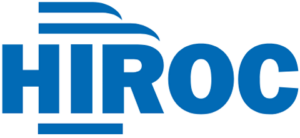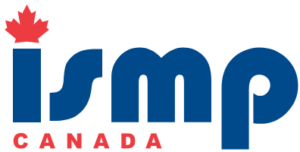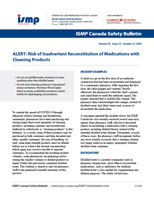ALERT: Risk of Inadvertent Reconstitution of Medications with Cleaning Products
This bulletin is shared to alert all pharmacy staff to the potentially harmful outcomes of preparing and/or storing the smaller volumes or diluted cleaning products in empty bottles that previously contained distilled water.
- Do not use distilled water containers to store anything other than distilled water.
- Do not store cleaning products in repurposed empty containers. Purchase, fill and apply labels to empty, unlabelled containers and/or bottles for repackaging such products.
INTRODUCTION
To combat the spread of COVID-19 through enhanced surface cleaning and disinfection, community pharmacies have been purchasing and storing larger-than-usual quantities of cleaning products, including sanitizers and disinfectants (referred to collectively as “cleaning products” in this bulletin). As a result, some of these products may be purchased in bulk containers and then decanted into other, smaller containers, for ease of handling. As well, some high-strength products must be diluted before use to achieve the desired concentration, which again may involve transfer to separate containers. To accommodate the resulting product volumes, some pharmacies are preparing and/or storing the smaller volumes or diluted products in empty bottles that previously contained distilled water. This bulletin is shared to alert all pharmacy staff to the potentially harmful outcomes of this practice.
INCIDENT EXAMPLES
A child was given the first dose of an antibiotic suspension that had been reconstituted and dispensed by a community pharmacy. After ingesting the first dose, the child gagged and vomited. Shortly afterward, the pharmacist called the child’s parents and asked them to smell the antibiotic liquid. The parents reported that it smelled like vinegar. The pharmacy then acknowledged that vinegar, instead of distilled water, had likely been used, in error, to reconstitute the medication.
A consumer reported the incident above, but ISMP Canada has also recently received several near-miss reports from pharmacy staff, who have described almost reconstituting a medication with a cleaning product, including diluted bleach, instead of the intended distilled water diluent. Fortunately, in each of these cases, the pharmacy staff recognized, before any error actually occurred, that a cleaning solution was being stored in an empty, improperly labelled distilled water container.
BACKGROUND
Distilled water is a product commonly used in pharmacy dispensaries, most often to reconstitute medications, such as antibiotics for children; distilled water is also needed for compounding and dilution purposes. The ability of end users (e.g., dispensary staff) to safely work with any product depends on many factors, including appropriate packaging and labelling, the context of use, and previous experience with the product.1,2 Many personnel associate a certain size, colour, and shape of container with distilled water. If an empty bottle that previously held distilled water is repurposed to store a different clear, colourless liquid, such as a cleaning product, and if no label, or if a poorly positioned or badly written label is applied, the contents can easily be mistaken for distilled water (see Figure 1). Placement of such a repurposed container in the area of the dispensary where distilled water is customarily stored can easily result in accidental use of the bottle contents to reconstitute or compound prescription medications.

FIGURE 1: The two photos show the front and back labels of a repurposed distilled water container being used to store diluted bleach.
RECOMMENDATIONS
Pharmacies and health care facilities should follow the recommendations below:
- Do not use distilled water containers to store anything other than distilled water.
- Do not store cleaning products (including sanitizers, disinfectants, or other products not intended for ingestion) in repurposed empty containers. Purchase and use empty, unlabelled containers for repackaging such products.
- Whenever cleaning products are repackaged, immediately label all sides of the new container and include a warning message (e.g., “for CLEANING”) or affix auxiliary warning labels (e.g., “For External Use Only, Not to Be Taken by Mouth”).
- Store all cleaning products in a specific location outside the dispensary area and return them to this storage location after use.
- Ensure that updated WHMIS training is provided for all pharmacy employees;3 there are labelling requirements for cleaning solutions.
- Dedicate space within the dispensary to store distilled water intended for prescription processing
This alert emphasizes the importance of a continuous quality improvement program and the value of shared learning. When practice changes occur, such as a change to cleaning protocols in response to a pandemic, pharmacy teams must work together to identify risks and potential unintended consequences.
![]()
The Canadian Medication Incident Reporting and Prevention System (CMIRPS) is a collaborative pan-Canadian program of Health Canada, the Canadian Institute for Health Information (CIHI), the Institute for Safe Medication Practices Canada (ISMP Canada) and Healthcare Excellence Canada (HEC). The goal of CMIRPS is to reduce and prevent harmful medication incidents in Canada.
Funding support provided by Health Canada. The views expressed herein do not necessarily represent the views of Health Canada.

The Healthcare Insurance Reciprocal of Canada (HIROC) provides support for the bulletin and is a member owned expert provider of professional and general liability coverage and risk management support.

The Institute for Safe Medication Practices Canada (ISMP Canada) is an independent national not-for-profit organization committed to the advancement of medication safety in all healthcare settings. ISMP Canada’s mandate includes analyzing medication incidents, making recommendations for the prevention of harmful medication incidents, and facilitating quality improvement initiatives.
Report Medication Incidents (Including near misses)
Online: ismpcanada.ca/report/
Phone: 1-866-544-7672
ISMP Canada strives to ensure confidentiality and security of information received, and respects the wishes of the reporter as to the level of detail to be included in publications.
Stay Informed
Subscribe to the ISMP Canada Safety Bulletins and Newsletters.
This bulletin shares information about safe medication practices, is noncommercial, and is therefore exempt from Canadian anti-spam legislation.
Contact Us
Email: cmirps@ismpcanada.ca
Phone: 1-866-544-7672
©2025 Institute for Safe Medication Practices Canada.
